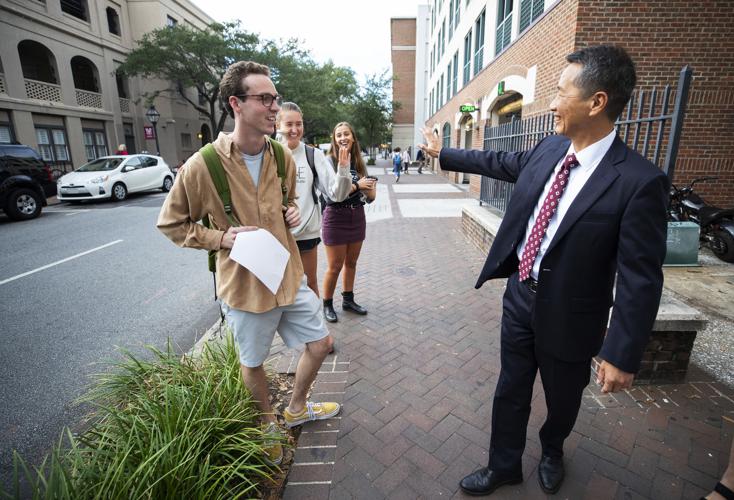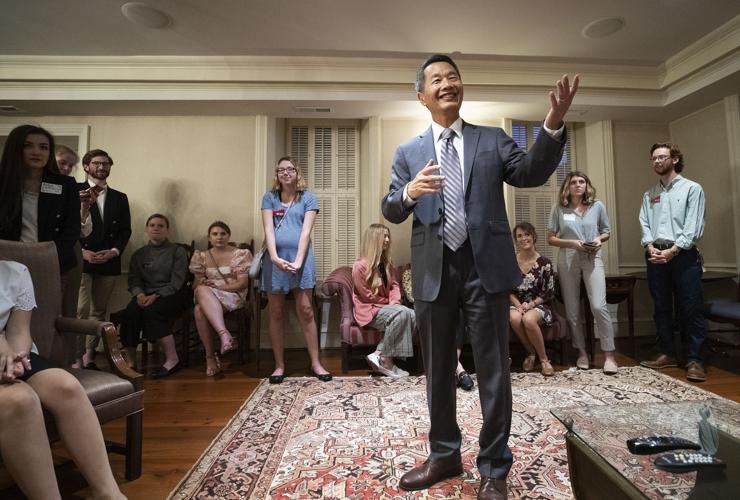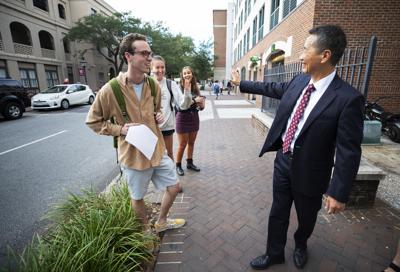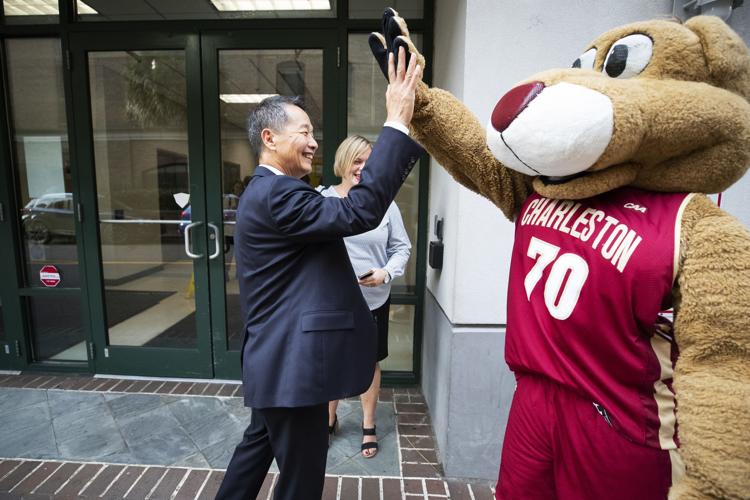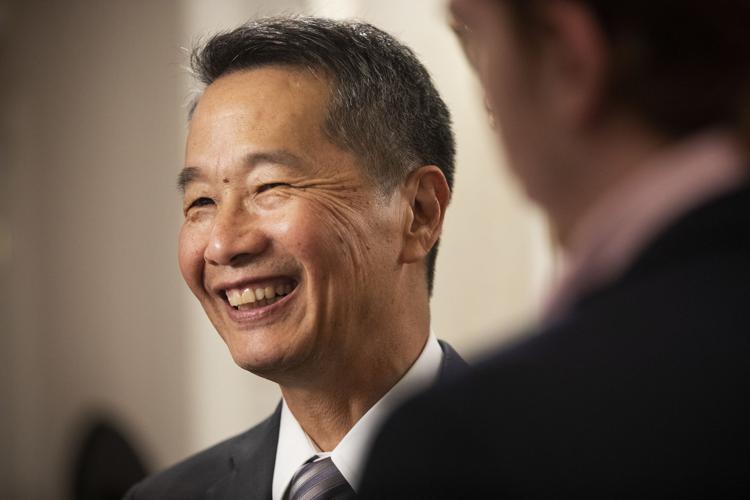As he walks across the College of Charleston's bustling campus, new President Andrew Hsu doesn't make it more than a few blocks before stopping to chat with a group of backpack-clad students.
A few hundred feet later, he smiles and waves to another student walking into her residence hall.
"He's sort of a celebrity, almost," said third-year public health student Hannah Rose Harrison. "Everyone knows who he is."
Hsu hosts regular office hours, and students who have met him said he's never one to turn down a quick selfie.
This transparency and accessibility have quickly provided Hsu with a good rapport among many students, faculty and staff at the college.
"I have yet to hear one peer of mine say anything negative about him," said Joseph Willingham, a third-year political science student. "His transparency with his office hours for the campus community is amazing. He’s also so hip and relatable, without seeming like he is trying to be."
"It’s crazy to think he’s only been here for a few months," Willingham added.
Hsu's path to the presidency has been anything but ordinary. The former aerospace engineer came to the United States after his family fled persecution in China during the Cultural Revolution.
As a teenager, he worked in the cotton fields of a rural Chinese village. He borrowed any books he could to teach himself English — everything from "Pinocchio" to "The Godfather."
He even read about Charleston in Margaret Mitchell’s “Gone With the Wind,” never imagining that 40 years later, he would take the helm of one of the city’s most prominent public institutions.
"I don't know if I should use the word 'strange' or 'miraculous,'" Hsu said. "I never thought that, one day, I'd be living there. This is really a miracle to me."
Although he's only served as president for less than five months, Hsu has already set his sight on some big goals for the college. His ultimate vision is establishing the college as a "top-tier," nationally recognized institution.
College of Charleston already has widespread appeal throughout the East Coast, Hsu said, but he hopes to elevate the school's success to a national, even international, level.
‘Hit the ground running’
Second-year English education student Hannah Finley was particularly impressed when Hsu emailed students with a midterms study playlist he created last week.
“I think the man is a legend,” Finley said. “I think everybody's a really big fan. ... You'll be like, ‘President Hsu,’ and they're like, ‘King.’”
The 10-track playlist spanned everything from Mozart’s “Piano Concerto No. 23 in A” to Weezer’s “Island in the Sun.”
“He's really involved with us," Finley said. "And he seems like he’s really excited to be here, and he seems like he really loves the role he’s jumping into.”
Sydney Williams, a second-year marketing student, agreed.
“He tried to put a mix of slower and faster songs, ones with lyrics and some without. I feel like it kind of shows how he wants to cater to everybody. He’s very accepting of everybody, even just in music taste,” she said.
Wooing college’s students as their school's new president isn’t always an easy task, said Student Government Association Student Body President George Hicks, but it’s a challenge Hsu has accepted willingly.

College of Charleston President Andrew Hsu laughs as he sits in a hanging chair in a dorm room on campus on Wednesday, October 9, 2019. Lauren Petracca/Staff
“I’ve been thoroughly impressed with the way he has come to campus and already gotten the students so involved in seeing him out and about, you know, engaging in student life,” he said. “It's very difficult for a new president at any university to come in and create that sense of interconnectedness with the students, and you know, mutual respect, trust and even admiration to a point. That's a very difficult job. And he has blown me away.”
The president often signs his emails to students with “Andrew,” instead of “Dr. Hsu” or “President Hsu,” noted Patrick Sheridan, a first-year graduate student.
Sheridan praised Hsu’s student outreach and also mentioned the study playlist.
“It’s just a little minor thing, but it kind of speaks to his character and how he views his role as president,” Sheridan said.
Anna Harkins, a first-year graduate student, first met Hsu on a sweltering afternoon this summer, not long after he and his family moved here. Harkins was manning a table at one of the college’s orientation fairs, something she did regularly.
“He talked to every single organization that was there,” Harkins said. “He came and shook my hand, and he spent five to 10 minutes just like talking to me at my table. Then he went to the next one.”
“He's such a personable guy. And I've never known a president of any of the past two that we’ve had to do that,” she added.
Hsu was elected by the board last November, almost 10 months after outgoing President Glenn McConnell announced he was retiring. Stephen Osborne became interim president in July 2018 and served until Hsu officially took office in May.
McConnell, a C of C graduate, was a powerful, longtime state lawmaker and lieutenant governor whose controversial ascent to the job in 2014 paralleled the University of South Carolina’s selection of President Bob Caslen this summer.
Like Caslen, McConnell was criticized for his lack of experience in higher education. Both choices were criticized as being driven by political considerations more than what was best for the school.
Outside his work as a lawmaker, McConnell was well known as an unapologetic defender of Confederate heritage. After he was selected, the faculty senate and student government associate gave the Board of Trustees a vote of “no confidence.” Many students participated in protests or walk-outs.
“He wasn't very popular, which is understandable. There was a lot of backlash,” Harkins said. “The process of getting our current president was a lot more student-involved. I felt like they really cared about what students thought because of how much backlash that McConnell did get.”
Hicks said the student government association worked closely with the board to ensure student feedback was taken into consideration.
“It was a very open and engaging process," Hicks said. "There were multiple forums for student leaders and students at large to come and be a part of the selection process from the very beginning.”
'Refreshingly candid'
Hsu has made a favorable impression on the college's faculty as well, said Richard Nunan, a philosophy professor.
"He is refreshingly candid, and articulate, about current and future challenges facing the college, in a way that none of us can really recall observing with past presidents," Nunan said, "and I’ve been here more than three decades."
Scott Peeples, an English professor and secretary of the faculty senate, had a similar view.
"Faculty are really optimistic about his presidency," Peeples said. "I think they feel like he is being more direct and honest with us, than perhaps previous administrators have been, in the sense of telling us more and telling it straight."
Robert Mignone, a mathematics professor, said he was impressed not only with Hsu's candor but also with his commitment to addressing some challenges the college faces, such as its rising cost of tuition and local demand for skilled laborers in science and engineering fields.
"Boeing, Bosch, Mercedes-Benz, Blackbaud — they're all here in our neighborhood, and they all need workforce talent," Hsu said. "And we're in the talent business, and we need to help them prepare the workforce."
Tradition and transformation
Hsu said his philosophy going into the presidency has been to remain focused on students. Without them, he said, he wouldn't be in the position that he's in now.
“In order for them to be successful, in order for me to know how to lead this institution to meet their needs, I have to be able to understand what they're thinking, what their concerns are, what their interests are, what their difficulties are,” Hsu said. “And I want them to be able to feel comfortable that they can reach me, they can stop me and talk to me.”
He added that interacting with students on campus or via social media is “one of the best perks of the job.”
Hsu hopes to focus his efforts on student success and all of its facets, including everything from retention to graduation rates.
As the college approaches its 250th anniversary, Hsu’s long-term vision will be folded into the college’s strategic plan.

College of Charleston President Andrew Hsu greets members of the Student Alumni Associates at the President's House on campus on Tuesday, October 8, 2019. Lauren Petracca/Staff
The goal of the strategic plan is to articulate a shared vision of the college’s future. He said that plan probably will have no more than five or six focus areas, and under each focus area, probably no more than 10 major initiatives.
While planning started over the summer, work on the plan really kicked off in August, as the college stated to conduct workshops, focus groups and surveys. Similar engagement opportunities will continue through October.
The Strategic Planning Committee will review all the information and outline strategic goals and priorities. By early next year, the college will hopefully have a draft for review. The board may approve the final version by April.
Meanwhile, Hsu's formal inauguration to the college is on Oct. 25.
"I've been telling faculty and staff that status quo is not an option, because the world is changing quickly around us, and if we don't change with the world, we're going to be left behind by the world," Hsu said. "So I think now, the campus is ready for change. So we're at a threshold, I think we're going to take off."

